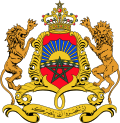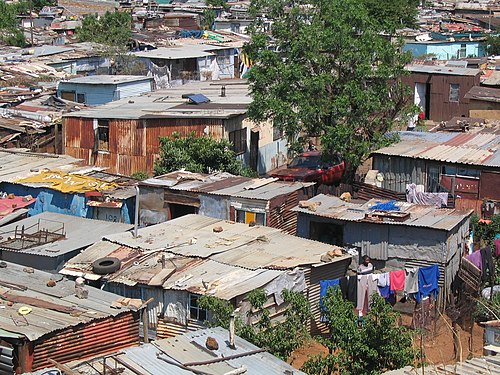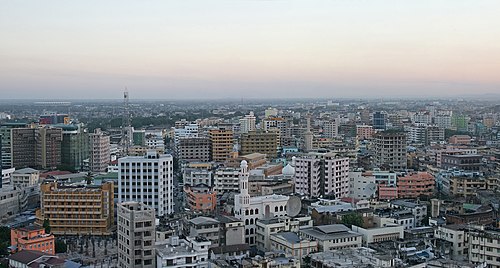Portal:Africa



Africa is the world's second-largest and second-most populous continent after Asia. At about 30.3 million km2 (11.7 million square miles) including adjacent islands, it covers 20% of Earth's land area and 6% of its total surface area. With nearly 1.4 billion people as of 2021, it accounts for about 18% of the world's human population. Africa's population is the youngest among all the continents; the median age in 2012 was 19.7, when the worldwide median age was 30.4. Based on 2024 projections, Africa's population will exceed 3.8 billion people by 2100. Africa is the least wealthy inhabited continent per capita and second-least wealthy by total wealth, ahead of Oceania. Scholars have attributed this to different factors including geography, climate, corruption, colonialism, the Cold War, and neocolonialism. Despite this low concentration of wealth, recent economic expansion and a large and young population make Africa an important economic market in the broader global context, and Africa has a large quantity of natural resources.
The continent includes Madagascar and various archipelagos. It contains 54 fully recognised sovereign states, eight cities and islands that are part of non-African states, and two de facto independent states with limited or no recognition. This count does not include Malta and Sicily, which are geologically part of the African continent. Algeria is Africa's largest country by area, and Nigeria is its largest by population. African nations cooperate through the establishment of the African Union, which is headquartered in Addis Ababa.
Africa is highly biodiverse; it is the continent with the largest number of megafauna species, as it was least affected by the extinction of the Pleistocene megafauna. However, Africa is also heavily affected by a wide range of environmental issues, including desertification, deforestation, water scarcity, and pollution. These entrenched environmental concerns are expected to worsen as climate change impacts Africa. The UN Intergovernmental Panel on Climate Change has identified Africa as the continent most vulnerable to climate change.
The history of Africa is long, complex, and varied, and has often been under-appreciated by the global historical community. In African societies the oral word is revered, and they have generally recorded their history via oral tradition, which has led anthropologists to term them "oral civilisations", contrasted with "literate civilisations" which pride the written word. African culture is rich and diverse both within and between the continent's regions, encompassing art, cuisine, music and dance, religion, and dress. (Full article...)
Selected article –
Positive Black Soul (also known as PBS) is a hip hop group based in Dakar, Senegal, one of the first such collectives in the country. Founded in 1989, the group is composed of Didier Sourou Awadi (alias DJ Awadi) and Amadou Barry (alias Doug E. Tee or Duggy-Tee), both of whom had previously been in other hip hop groups. They perform in the English, French, and Wolof languages and use traditional Senegalese instruments as part of their songs. Political and social activism have played important roles in the group since it was founded. (Full article...)
Featured pictures –
Did you know (auto-generated) -

- ... that The Red Moon was the first Broadway show to depict alliances between African Americans and Native Americans?
- ... that in the aftermath of the American Civil War, the only Black-led organization providing teachers to formerly enslaved people was the African Civilization Society?
- ... that 555 Edgecombe Avenue, once named for a British soldier and occupied entirely by white Americans, later attracted notable African Americans like Paul Robeson and Count Basie?
- ... that Franklin Sonn was the first black South African ambassador to the United States?
- ... that Susan Murabana created Africa's first permanent planetarium?
- ... that former Arizona Cardinals kicker Cedric Oglesby, one of the first African-American kickers in NFL history, received his chance to play when the team's previous kicker injured himself celebrating?
Categories
Selected biography –
Chimamanda Ngozi Adichie (born Grace Ngozi Adichie; 15 September 1977) is a Nigerian writer of novels, short stories, poem, and children's books; she is also a book reviewer and literary critic. Her most famous works include Purple Hibiscus (2003), Half of a Yellow Sun (2006), and Americanah (2013). She is widely recognised as a central figure in postcolonial feminist literature.
Born into an Igbo family in Enugu, Nigeria, Adichie was educated at the University of Nigeria in Nsukka, where she studied medicine for a year and half. She left Nigeria at the age of 19 to study in the United States at Drexel University in Philadelphia, Pennsylvania, and went on to study at a further three universities in the U.S.: Eastern Connecticut State University, Johns Hopkins University, and Yale University. (Full article...)
Selected country –
 |
 |
|

| ||
Morocco, officially the Kingdom of Morocco (Arabic: المملكة المغربية), is a country in North Africa. It has a coast on the Atlantic Ocean that reaches past the Strait of Gibraltar into the Mediterranean Sea. Morocco has international borders with Algeria to the east, Spain to the north (a water border through the Strait and land borders with two small Spanish autonomous cities, Ceuta and Melilla), and Mauritania to the south.
The full Arabic name Al-Mamlaka al-Maghribiya translates to "The Western Kingdom." Al-Maghrib (meaning "The West") is commonly used. The Latinized name "Morocco" originates from medieval Latin "Morroch," which referred to the name of the former Almoravid and Almohad capital, Marrakech.
Morocco is a de jure constitutional monarchy. The King of Morocco, with vast executive powers, can dissolve the government and deploy the military, among other prerogatives. Opposition political parties are legal, and several have been formed in recent years. (Read more...)
Selected city –
Bangui (French pronunciation: [bɑ̃ɡi]; or Bangî in Sango, formerly written Bangi in English) is the capital and largest city of the Central African Republic. It was established as a French outpost in 1889 and named after its location on the northern bank of the Ubangi River (French: Oubangui); the Ubangi itself was named from the Bobangi word for the "rapids" located beside the settlement, which marked the end of navigable water north from Brazzaville. The majority of the population of the Central African Republic lives in the western parts of the country, in Bangui and the surrounding area.
The city has been part of Bangui Prefecture since December 2020. As of 2020[update] it had an estimated population of 889,231. (Full article...)
In the news
- 22 July 2025 – Constitutional crisis in Somalia
- Jubaland crisis
- At least ten people were killed after Jubaland forces claim they have taken full control of the Beled Hawo District headquarters as well as the entire city, following a heavy fighting with Somali National Army from the Federal Government of Somalia. (Garowe Online)
- 20 July 2025 – Terrorism in Egypt
- Egyptian police kill two suspected militants belonging to the Hasm Movement, an affiliate of the outlawed Muslim Brotherhood, during a raid on their hideout in Giza. One passerby is also killed. (Al-Ahram)
- 19 July 2025 – M23 campaign
- The M23 paramilitary group and the government of the Democratic Republic of the Congo sign a declaration of principles stating that a full ceasefire and final peace agreement will be signed no later than August 18, and that it will be aligned with the earlier DR Congo–Rwanda agreement. (CNN)
- 17 July 2025 – Somali Civil War
- At least six people are killed and ten others are injured after a fresh outbreak of tribal violence in the Galgaduud region of Somalia. (Hiiraan Online)
- 16 July 2025 – Herder-farmer conflicts in Nigeria
- At least 27 people are killed when unidentified gunmen attack a village in Riyom, Plateau State, Nigeria. (BBC News) (AP)
Updated: 5:05, 23 July 2025
General images -
Africa topics
More did you know –
- ...that Iyabo Obasanjo-Bello, a Nigerian Senator from the People's Democratic Party, is the daughter of former President Olusegun Obasanjo?
- ...that the 2007 South Africa miners' strike, which impacted over 240,000 workers, was the first ever industry-wide miners' strike in the history of South Africa?
- ...that Seleh Leha, a town in Tigray Region in northern Ethiopia, was the site of a leprosarium built during the Italian occupation of East Africa and abandoned in 1941?
- ...that Sarir field, an oil field in Cyrenaica operated by the Arabian Gulf Oil Company (AGOCO), is considered to be the largest in Libya, with estimated oil reserves of 12 Gbbl (1.9×109 m3)?
Related portals
Major Religions in Africa
North Africa
West Africa
Central Africa
East Africa
Southern Africa
Associated Wikimedia
The following Wikimedia Foundation sister projects provide more on this subject:
-
Commons
Free media repository -
Wikibooks
Free textbooks and manuals -
Wikidata
Free knowledge base -
Wikinews
Free-content news -
Wikiquote
Collection of quotations -
Wikisource
Free-content library -
Wikispecies
Directory of species -
Wikiversity
Free learning tools -
Wikivoyage
Free travel guide -
Wiktionary
Dictionary and thesaurus




























































































